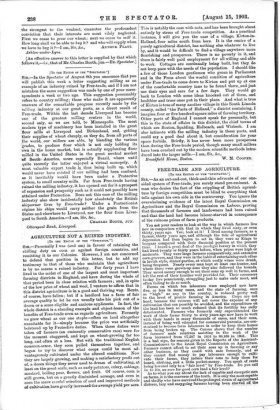FREE-TRADE AND AGRICULTURE.
[TO THE EDITOR OF THE "SPECTATOR."].
SIR,—As an out-and-out, thick-and-thin advocate of our one- sided system of Free-trade, you surely stand pre-eminent. A man who denies the fact of the crippling of British agricul- ture by foreign competition must be blind to everything that tells against his own side in the controversy. You ignore the overwhelming evidence of the latest Royal Commission on Agriculture and the Royal Commission on Labour, proving that thousands of farmers and landowners had been ruined and that the land had become labour-starved in consequence of the ruinous prices of farm products.
You ask your readers to look at the way in which farmers live now in comparison with that in which they lived sixty, or even thirty, years ago. Yes.; look at it I lived among farmers, as a farmer, thirty years ago, and although the tide of agricultural depression had then begun to set in, they were as Kings to beggars compared with their financial position at the present time. I heard a great deal of the prodigal luxury in which they had lived twenty or thirty years before, when prices were high or moderate. They were large farmers comparatively, and extensive corn-growers, and they were in the habit of entertaining each other in lavish style, dinner-parties, at which costly wines were drunk, being frequent. Nearly every man kept at least one hunter, and where there were grown-up sons they also followed the hounds. They saved money enough to set their sons up well in farms, and left the rest of their families well provided for. Their successors to-day live penuriously, struggling just to make ends meet, and often failing to do so much.
Farms on which ten labourers were employed now have five, or less in many cases, and the state of farming, once as "high" as any in the country, is reduced pretty well to the level of prairie farming in America. Crops are not hoed, because the returns will not cover the expense of any cultivation that can possibly be avoided, and the expenditure on the land has been so much reduced that its fertility has sadly deteriorated. Farmers who formerly only superintended the work of their farms thirty to sixty years ago now have to work with their hands in many thousands of eases, and their sons, instead of being well educated for commercial pursuits, are con- strained to become farm labourers in order to keep their homes from being broken up. The Census shows that the number of farmers' male relatives assisting in the work of the farm increased from 67,287 in 1891 to 89,165 in 1901. This is a bad sign, for reasons given in, the Reports of the Assistant- Commissioners to the latest Royal Commission on Agriculture. Farmers cannot afford to set their sons up in farming or any other business, as they could with ease formerly, and as they cannot find money to pay labourers enough to cUlti- vate their farms, they induce their sons to help them for board, clothing, and a little pocket-money. You speak of rents being lowered only to a "fair level" by Free-trade. Do you call 5s. to 102. an acre for good corn land a fair level?
As to what you say about the lack of capable and energetic men on farms, it is the converse of the truth. It is only the most capable and thrifty who have survived the prolonged strain of agricultural distress, lazy and easygoing farmers having been starved off, the
land. I feel sure that any one who has had opportunities of becoming familiar with the farmers of the present and earlier times will support my assertion that the existing farmers are more capable, energetic, and well informed than their prede- cessors. The periodical epidemics of agricultural distress which occurred in the days of Protection happened when the absurdly high duties had forced up rents; and yet, in consequence of a glut in home production, did not act to keep up prices. This could not happen now. No one proposes high duties. French farmers, entirely owing to Protection, are fairly prosperous, and agricul- -tire in France has vastly 'Unproved recently, and is improving,— conditions which are the converse of those prevailing in this country.
[The subject of this letter is dealt with in our leading columns.—ED. Spectator.]







































 Previous page
Previous page